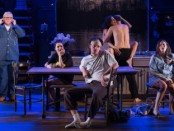Only Yesterday
As John, Christopher Sears is an enjoyable pill, perfectly offset by Tommy Crawford's Paul whose amiable placidity is almost Buddha-like. More importantly, both actors have impressive musical chops, which wonderfully serves Stevens' truncated overview of Paul and John's tuneful reminiscing about their musical influences: Chuck Berry, Bobby Freeman, Gene Vincent. Sears even has the opportunity to do a bit of Elvis Presley hip swiveling that feels absolutely perfect in its oh-so-British imperfection. [more]



